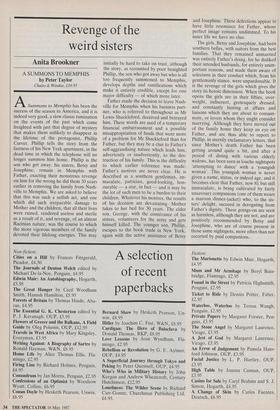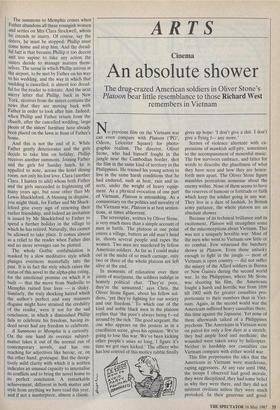Revenge of the weird sisters
Anita Brookner
A SUMMONS TO MEMPHIS by Peter Taylor Chatto &Windus, £10.95 ASummons to Memphis has been the success of the season in America, and it is indeed very good, a slow classic rumination on the events of the past which come freighted with just that degree of mystery that makes them unlikely to disappear in the lifetime of the protagonist, Phillip Carver. Phillip tells the story from the fastness of his New York apartment, in the dead time in which the telephone will no longer summon him home. Phillip is the son who got away: his sisters, Betsy and Josephine, remain in Memphis with Father, exacting their monstrous revenge on him for the wrong he did them 30 years earlier in removing the family from Nash- ville to Memphis. We are asked to believe that this was such a selfish act, and one which did such irreparable damage to Mother and the children, that all their lives were ruined, rendered useless and sterile as a result of it, and revenge, of an almost Racinian nature, was the course to which the more vigorous members of the family devoted their lifelong energies. This may initially be hard to take on trust, although the story, as recounted by poor benighted Phillip, the son who got away but who is all too frequently summoned to Memphis, develops depths and ramifications which make it entirely credible, except for one major difficulty - of which more later.
Father made the decision to leave Nash- ville for Memphis when his business part- ner, who is referred to throughout as Mr Lewis Shackleford, deceived and betrayed him. These words are used of a temporary financial embarrassment and a possible misappropriation of funds that were more of a problem for Mr Shackleford than for Father, but they may be a clue to Father's self-aggrandising nature which leads him, advertently or inadvertently, to the des- truction of his family. This is the difficulty to which earlier reference was made: Father's motives are never clear. He is described as a southern gentleman, im- maculate, patrician, good-looking, hon- ourable - a star, in fact - and it may be the lot of such men to be a burden to their children. Whatever his motives, the results of his decision are devastating. Mother takes to her bed for 30 years. The elder son, George, with the connivance of his sisters, volunteers for the army and gets himself killed. The younger son, Phillip, escapes to the book trade in New York, again with the active assistance of Betsy and Josephine. These defections appear to have little resonance for Father, whose perfect image remains undimmed. To his inner life we have no clue.
The girls, Betsy and Josephine, had been southern belles, with suitors from the best families. That they remained unmarried was entirely Father's doing, for he disliked their intended husbands, for entirely unim- portant reasons, and made them aware of solecisms in their conduct which, from his gentlemanly stance, were unpardonable. It is the revenge of the girls which gives the story its heroic dimension. When the book opens the girls are in their fifties, over- weight, indiscreet, grotesquely dressed, and constantly hinting at affairs and liaisons which they are about to consum- mate, or lovers whom they might consider marrying. Although they have moved out of the family home they keep an eye on Father, and are thus able to report to Phillip, in merrily exclamatory letters, that since Mother's death Father has been getting around quite a bit, and after a period of dining with various elderly widows, has been seen in louche nightspots `attempting to dance' with a 'youngish woman'. This youngish woman is never given a name, status, or indeed age, and it becomes clear that Father, now 81 but still immaculate, is being cultivated by fairly unsavoury companions (one of them wears a maroon dinner-jacket) who, to the sis- ters' delight, succeed in derogating from Father's dignity. These goings-on are seen as harmless, although they are not, and are positively recommended by Betsy and Josephine, who are of course present in those same nightspots, more often than not escorted by paid companions. The summons to Memphis comes when Father abandons all these youngish women and settles on Mrs Clara Stockwell, whom he intends to marry. Of course, say the sisters, he must be stopped: Phillip must come home and stop him. And the dread- ful fact is that because Phillip it too decent and too supine to take any action the sisters decide to manage matters them- selves. The scene in which Phillip arrives at the airport, to be met by Father on his way to his wedding, and the way in which that wedding is cancelled, is almost too dread- ful for the reader to tolerate. And the next merry letter that Phillip, back in New York, receives from the sisters contains the news that they are moving back with Father in order to look after him. Indeed, when Phillip and Father return from the church, after the cancelled wedding, large pieces of the sisters' furniture have already been placed on the lawn in front of Father's house.
And this is not the end of it. While Father gently deteriorates and the girls decide to take him on holiday, Phillip receives another summons. Joining Father and the girls for Sunday lunch, he is appalled to note, across the hotel dining room, not only his lost love, Clara (another Clara, I hasten to add) whom both Father and the girls succeeded in frightening off many years ago, but none other than Mr Lewis Shackleford. A blessing in disguise, you might think, for Father and Mr Shack- leford give every sign of renewing their earlier friendship, and indeed an invitation is issued by Mr Shackleford to Father to spend a further holiday in the village to which he has retired. Naturally, this cannot be allowed to take place. It comes almost as a relief to the reader when Father dies and no more revenges can be plotted.
The whole Gothic confabulation is masked by a slow meditative style which plunges evermore masterfully into the past. It is in fact the style which raises the status of this novel to the alpha-plus rating, for the emotional premise on which it is built — that the move from Nashville to Memphis ruined four lives — is shaky. Similarly, the truly shocking hatred which the author's perfect and easy manners disguise might have strained the credulity of the reader, were it not for the sad conclusion, in which a diminished Phillip fails to celebrate his freedom, having in- deed never had any freedom to celebrate.
A Summons to Memphis is a curiosity. On the one hand its oversize subject- matter takes it out of the normal run of contemporary novels, and has one reaching for adjectives like heroic, or, on the other hand, grotesque. But the decep- tively mild clarity with which it is written indicates an unusual capacity to internalise its conflicts and to bring the novel home to its perfect conclusion. A remarkable achievement, different in both matter and style from anything we have read this year, and if not a masterpiece, almost a classic.





















































 Previous page
Previous page